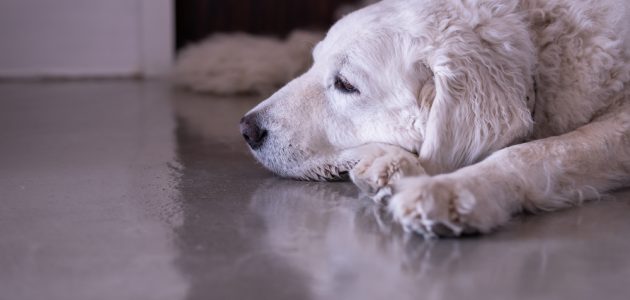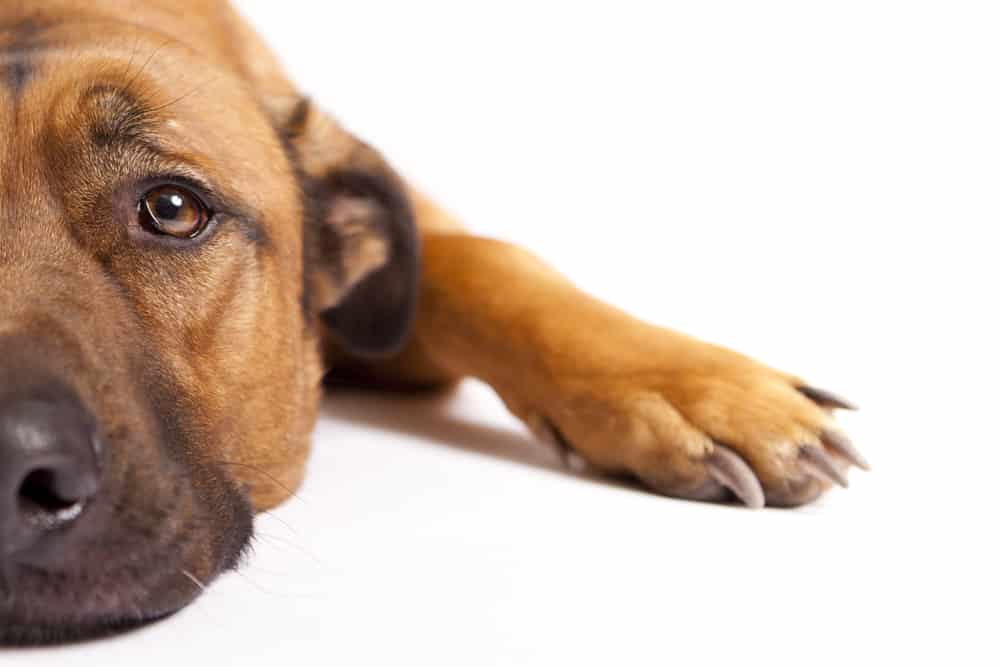How Long Can a Dog Go Without Eating?

You finally managed to move into the new place. You can hear your kids running and laughing upstairs. Your spouse is resting on the porch, balancing softly in the rocking chair. Everyone seems to love this home. Well, with one notable exception.
Your dog doesn’t seem thrilled about it. She hasn’t been very active lately. Come to think of it, you don’t remember seeing her eat since you moved. You check her water fountain and see that she’s been drinking water. But her food is untouched. You’re pretty certain that you filled her bowl when you arrived, two days ago.
How long can a dog go without eating? Should you be worried? And what could you do about it? Read on to find out.
Why Do Dogs Stop Eating?
Just like humans, dogs have their own personalities. Some of them are picky eaters by nature, while others will devour everything in front of them, including sofa cushions. But there are four common reasons why dogs suddenly stop eating:
Picky Eating
Even famished dogs can be picky eaters. And the thing is, your dog will probably dislike certain types of foods. Your furry companion might love lamb-flavored foods but dislike veal-flavored ones, or the other way around. Some fussy eaters might even like veal-flavored kibble produced by certain brands and dislike the kibble produced by others.
Diet Foods
Your pooch might not be thrilled to go on a diet, even though your veterinarian recommends it. And that’s easy to understand. Humans don’t like going on a diet either. Replacing your dog’s regular food with diet food, especially with low-fat food, might upset them and convince them to go on a hunger strike.
Lifestyle Changes
Lifestyle changes can affect your furry friend’s appetite. Moving into a new home, introducing a new pet or a baby into your household, changing your routine, or other lifestyle changes can severely impact your dog’s emotional wellbeing. Sometimes, lifestyle changes can even lead to depression.
Health Problems
Your buddy might stop eating when she feels under the weather. And the truth is that your dog doesn’t have to suffer from a life-threatening illness to stop eating. Things like nausea, toothaches, or anal gland issues can affect your dog’s appetite. However, some serious health issues like pancreatitis, parvo infections, or anemia can also impact your dog’s eating habits. If you suspect that your dog is feeling unwell, you should consult with your local vet.
How Long Can Your Dog Go Without Food?
If a dog is otherwise healthy and is still drinking plenty of water, they can likely go three-to-five days without any food. In rare cases, dogs may even be able to go up to seven days without eating; however, you should absolutely never let your dog go this long without food.
However, just because your dog can go three days without eating doesn’t mean it’s healthy for them to do so.
When to Contact Your Vet
If you suspect that your dog hasn’t eaten anything for two days or more, or if you suspect that your dog is not feeling well, you should contact your vet as soon as possible.
Your veterinarian will most likely perform a physical examination and run some tests to identify your dog’s feeding problem. Once they identify the problem, they will likely help you restore your dog’s appetite.
What Should You Do if Your Dog Stops Eating?
If your dog has stopped eating, there are a few important steps you can take to help keep them as healthy as possible – and get them back to eating normally.
Determine When Your Dog Last Ate
The first thing you should do is determine the last time your dog ate. If your dog skipped over a single meal, there’s no reason to panic. She’ll probably eat more the next time she does. Some dogs might refuse food for a short period of time without any long-term effects.
As long as your dog isn’t showing any signs of illness, skipping over some meals shouldn’t be a problem. In fact, some scientists argue that dogs shouldn’t eat several times per day in the first place.
Here’s the thing. Even though dogs have lived alongside humans for about 100,000 years, they haven’t received regular meals until about 100 years ago. Scientists argue that, from an evolutionary point of view, their digestive systems are not even suited to eating two or three times per day. A 2006 study showed that dogs become obese when their owners free feed them (by refilling their bowl whenever it’s empty) because the food surplus encourages dogs to ignore their hunting behaviors.
So your dog might fast for a day or two because that’s what her genetic memory tells her to do. It’s not necessarily a bad thing.
However, if your dog has skipped multiple meals, it’s time to start considering what the cause may be.

Determine Why Your Dog Stopped Eating
Try to determine why your dog isn’t eating. If you can find out why your dog stopped eating, you can probably make some changes to help restore her appetite.
Here are some of the most common questions you should ask yourself when your dog isn’t eating:
Is Your Dog Feeling Well?
Your dog may be refusing food because there’s something wrong with her. There are a lot of medical issues that may affect your dog’s appetite. Some of the most common health issues that can trigger food refusal are:
- Digestive problems such as nausea or diarrhea
- Infections
- Dental Problems
- Pain
- Parasites
- Allergies
- Intestinal obstructions
- Autoimmune diseases
- Cancer, and
- Organ Failure.
Some of these, like organ failure and cancer, are extremely serious medical issues that require prompt medical treatment. Watch for any accompanying signs that might indicate an urgent medical condition, such as:
- Apathy
- Coughing
- Sneezing
- Excessive panting
- Labored breath
- Frequent digestive upsets
- Foul breath
- Stiffness or difficulty in rising
- Excessive drinking and/or urination
- Dry or itchy skin, and
- Sores or lumps.
If you notice any of these signs, you should contact your veterinarian as soon as possible.
Unfortunately, you can’t always tell when your dog is sick; even experienced dog owners might attribute some signs of disease to aging. If your dog isn’t eating and you aren’t sure what the cause is, it may be best to contact your vet, if only for your peace of mind.
Did You Change Your Dog’s Food?
Changing your dog’s food might lower her appetite for a while. This is a common problem that’s usually easy to solve.
The best way to introduce your dog to new food is to change it gradually. You can do so by mixing the new food with your dog’s old food in increasing amounts. A typical food-transition regimen unfolds over five days:
- Day 1 – One part new food, four parts old food. You can eyeball the quantities or use a kitchen scale for an accurate measurement.
- Day 2 – Two parts new food, three parts old food.
- Day 3 – Three parts new food, two parts old food.
- Day 4 – Four parts new food, one part old food.
- Day 5 – Exclusively new food.
You can make the transition even more gradual if your dog selects the old food and avoids the new one. Use your best judgment for optimal results.
Is Your Dog’s Food Spoiled or Contaminated?
Your furry companion might refuse to eat because there’s a problem with the food you’re providing.
Keep in mind that your dog is more sensitive to bad smells than you are, so she might detect any off-putting odors before you do.
Examine the food closely and check if something is amiss. Is the food discolored? Does the food smell differently than it usually does? Are there any signs of molds or fungi?
Check the food’s expiration date on its package. Is it still good or has it expired? Expired food might lose its taste, which might make it unappealing for your dog.

Is Your Dog Taking Any Medication?
There are a lot of medications that can reduce your furry friend’s appetite. Some medications may inhibit appetite directly by reducing the amount of ghrelin in your dog’s body. Ghrelin is known as the hunger hormone, and reduced levels of ghrelin manifest as a reduced appetite.
Other medications can make your dog nauseated, which may explain her disinterest in eating. If your dog is on any type of medication, check the drug’s label and see if its side or unwanted effects include reduced appetite.
It may be a good idea to consult with your vet if you notice that your dog’s appetite changed right after you started a certain treatment. Your veterinarian may be able to change your dog’s prescription to something that won’t affect her appetite.
Is Your Dog’s Reproductive Cycle Affecting Her Appetite?
While uncommon, female dogs may lose their appetite when they’re in heat, especially if it’s their first reproductive cycle.
When your dog is in heat, her hormones start acting up and mating becomes her body’s foremost priority. The hormonal changes might also trigger some unusual behavior, such as crying, frequent urination, sleeping more than usual, laziness, and lethargy.
Your dog might not be interested in food during her heat cycle, so it might be a good idea to encourage her to eat by providing her favorite foods, treats, and snacks.
Are You Feeding Your Dog Too Early?
Most people enjoy a fairly light breakfast of easy-to-digest foods. Your dog might not feel like eating a lot right after waking up either. Feeding your dog before leaving for work is easy for you because it fits into your schedule, but your dog might not want to eat that early.
And if your dog is a picky eater, she might not want to eat the food you left for her in the morning later in the day. If you suspect that your dog is not eating because you’re feeding her too early, try changing her feeding schedule. Maybe she’ll eat if you feed her when you come home from work.
Is Your Pet Too Intimidated to Eat?
If you have two or more dogs, one of them might act like the Alpha and one might be treated as the Omega. Just like wolves, dogs follow a social hierarchy. And their social status influences their feeding behaviors.
Dominant individuals eat more than subordinates. In wolves, the subordinates spend a lot of time near the dominant individuals to secure their access to food. But subordinate dogs don’t do that. Subordinate dogs stay away from the resource and the dominant individual. So your dog might not eat because she’s being intimidated by one of your other dogs.
If you suspect that one of your dogs is intimidating the other into not eating, it might be a good idea to feed your dogs separately. You can do this by feeding your dogs in separate rooms or at separate times. You could also try feeding your dogs at the same time while standing between them to make sure that all of them eat.
Did You Make Any Changes That Might Affect Your Dog?
Just like humans, dogs can suffer from stress, anxiety, and depression. And it’s not uncommon for dogs that suffer from emotional and/or mental health to lose their appetites.
Moving to a new home, introducing a new pet or child into your household, or the loss of a loved one are only some of the reasons why your dog might be depressed. Fortunately, you can bolster your dog’s spirits with simple gestures.
For example, you might find that your dog starts eating and being more active if you spend more time with her. Playing with her, buying her a new toy, going for long walks, or going to her favorite spots can help her feel better.
Similarly, if you think that your dog is stressed because of the loud traffic around your new home or a nearby construction project, you could use white noise to help her relax.
Tempt Your Dog With Her Favorite Food
If your dog is not eating, try tempting her with her favorite food. That might get her spirits up and her appetite back. And if your furry friend eats, you could probably say for certain that your dog’s feeding problem is actually a food-related problem. Changing her food might convince her to eat again.
Help Keep Your Dog Healthy, Happy, and Eating
Be mindful of your dog’s eating habits, so that it’ll quickly be clear to you when there is a problem. As a rule, a missed meal here or there is no big deal. But if your dog is stubbornly resisting more than one meal, make sure to zero in on the cause and help him to eat again. Keep these tips in mind, and your furry best friend will be eager for her next treat!




